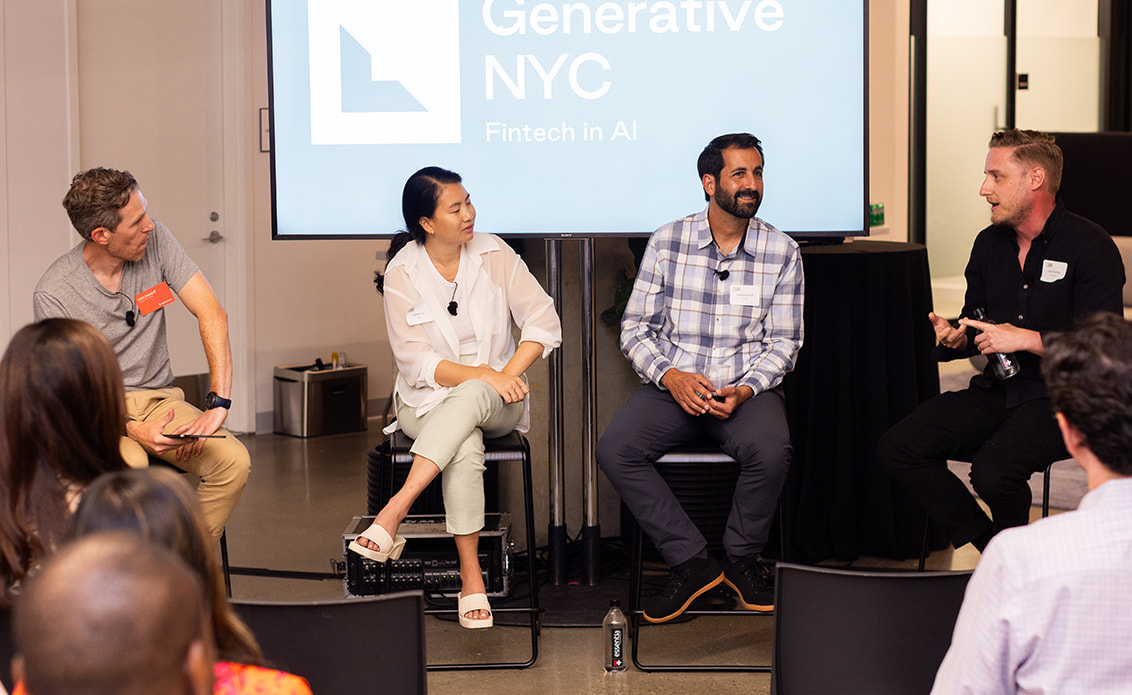
Lightspeed recently hosted the latest in its Generative AI series, “Fintech in AI” at our New York City office. Lightspeed has been investing in AI for over a decade, and launched the meetups to bring together Founders, builders, and investors working in the generative AI space to trade ideas and learn from each other. The panel was moderated by Justin Overdorff, a partner who heads the firm’s fintech practice. On the panel were Grace Liu, Alloy’s Director of Product; Sasha Orloff, founder and CEO of Puzzle.io; and Leif Abraham, co-founder and co-CEO of Public.com. They brought hopes, worries and deep expertise to the topic.
Five clear lessons from the discussion (for founders and builders alike) emerged from the evening:
1. Generative AI will increase your productivity, saving you time, money, and tedium
Whether debugging code, assessing risk, or bookkeeping, tasks that would have taken weeks last year – or perhaps been impossible – can now be accomplished in seconds. For early-stage companies, hiring accountants, for example, can be prohibitively expensive. But Orloff pointed out that while it takes six years to become a CPA, with generative AI, “you don’t need to know accounting to do accounting.” Many entrepreneurs will be freed from boring, repetitive labor to focus on the dimensions of their business that they’re most passionate about. “AI can handle the busywork,” Abraham said, resulting in a “massive productivity boost, and people will be more fulfilled.”
2. You still need to hire professionals when it matters
Just because you can do accounting without an accountant or write a coherent blog post with a math degree, doesn’t mean you should. When the stakes are high, expertise is still needed, Orloff explained that at his company, Puzzle, they tag all work done by AI. “Then if you don’t care that much,” he said, “because accounting isn’t that big a deal at that moment, at this stage of your company, you can just take it and run with it for analysis and insights.” But sometimes the stakes are too high to depend on AI. “If you’re submitting it to the IRS or sharing with investors,” he elaborated, “you’re going to want to review it with a professional [accountant], just like if you’re going to publish something, you want to have a good copywriter review this output. You don’t want to just copy and paste it.”
3. The fraud risks are terrifying
Liu stressed that AI-enabled financial fraud is real and “happening right now.” For example, AI voice cloning, she emphasized, is “really real and really scary.” It may be fun when it allows the long-dead Frank Sinatra to perform a Dua Lipa cover, she observed, but how about when it permits fraudsters to accurately clone your voice, convincing your family and friends to drain their life savings to pay ransom to fake kidnappers in order to save you? Fake communications from banks, too, are becoming much more convincing. “A lot of consumers aren’t going to trust financial institutions anymore,” Liu warned. “It’s our job to innovate and protect our customers.”
4. Whatever the government does can help you
During a Q&A period following the panel discussion, when an attendee brought up policy, Orloff said that both regulation, and lack thereof, create opportunities, “so I think, as a Founder, they both create opportunities.” An unregulated market, he explained, gives Founders the freedom to “figure out and try and create the business you want.” But regulation can be good for Founders, too: “anytime there’s a big market shift, it means there’s an opportunity. Somebody’s going to lose and somebody’s going to win.” Those who can take advantage of the changing regulatory environment and “adapt faster,” he said, will be winners.
5. Move fast
Orloff sees our current moment as an inflection point for innovation in AI. “There’s a huge opportunity right now in literally every possible industry,” he explained, exhorting the crowd of Founders to make the most of it. “It’s hard when you have an existing revenue stream, and a three-year board-approved company plan, to change the course of the ship, right? It’s like moving the Titanic. So there’s probably a good three to five years that you guys have an opportunity to take advantage. And if you can’t build a powerful wedge in three to five years, then chances are you aren’t going to crush an incumbent, the incumbent is going to crush you.”


